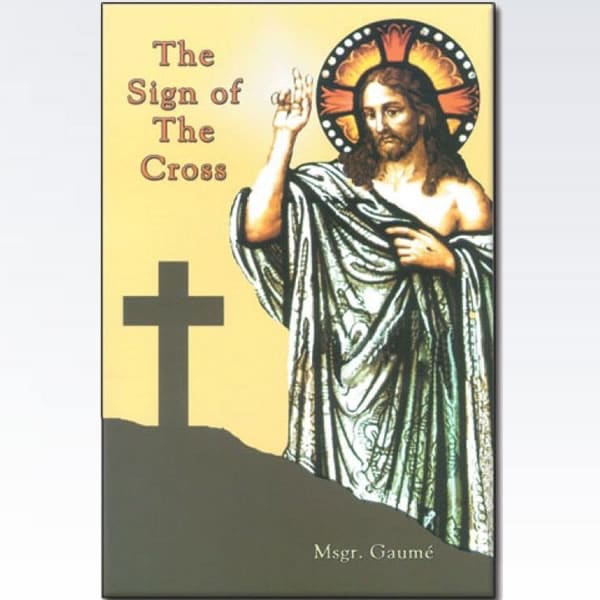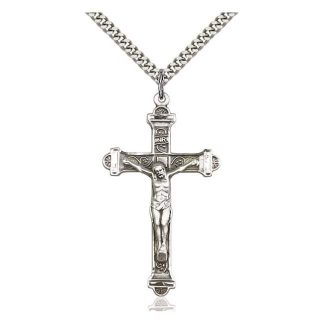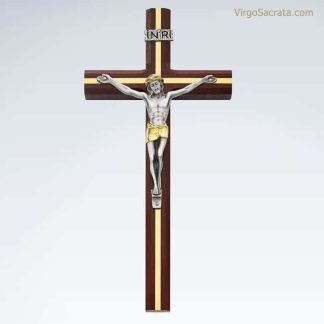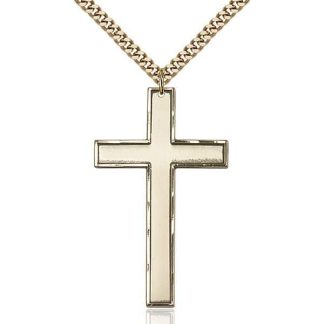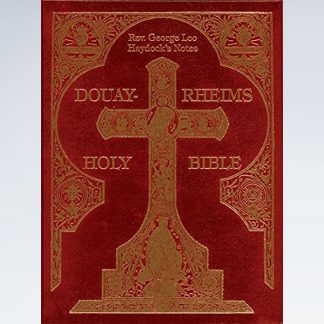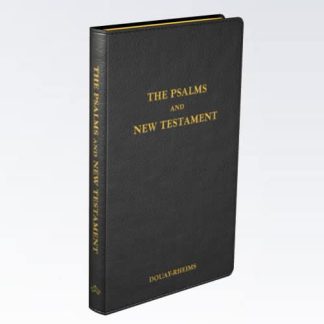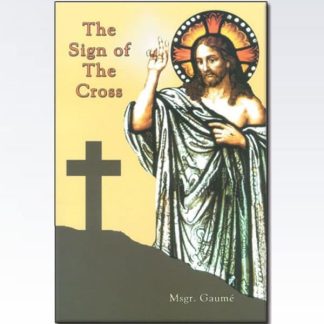The Holy Sign of the Cross is the most important prayer and symbol of our Catholic faith. It is at once the image of Christ’s passion, the sign of the redemption of all mankind, the awesome testament of the destruction of the power of the devil and of his kingdom on earth. The resurrection is the promise and seal and guarantee of eternal life which consummated the work of the Cross.
Christians rejoice and the demons tremble to see the Sign of the Cross emblazoned everywhere as proof of Christ’s victory over the world. Christ said “all power is given to me in heaven and on earth” and the Cross is the seat of that power. There is no place on earth where a person who makes the Sign of the Cross is not immediately recognized as a Catholic, and there is no miracle that has not been worked under this sign. It is the “nuclear bomb” of prayers and with it the faithful can clear away all enemies and temptations with the simplest of wordless gestures.
Msgr. Gaume has compiled a magnificent collection of history and commentary from the saints and fathers and doctors, as well as his own meditations and exhortations regarding this most powerful prayer. An entire book on the Sign of the Cross might seem boring – trust me, it is absolutely fascinating. You will never make this holy sign in haste again.
PREFACE TO THE FIRST EDITION: In the month of November of the year 1862, a young German Catholic of great distinction arrived in Paris to pursue his course in the College of France. Faithful, according to the traditional usage of his country, to make the Sign of the Cross before and after meals, he, on the first day, became the wonder of his school-companions. The next day, in virtue of the freedom of worship, he was the object of their mockeries. In one of his visits, he begged us to tell him what we thought of the practice, of which his companions were trying to make him ashamed, and of the Sign of the Cross in general. The following letters are intended as an answer to those two questions.
The Sign of the Cross ✝
Table of Contents
FIRST LETTER. State of the Question — The Present World does not make the Sign of Cross, or makes it seldom, or makes it badly — The Primitive Christians made it, they made it frequently, they made it well — We are right, and they were wrong, or we are wrong, and they were right; which is true?
SECOND LETTER. Examination of the Question — Prepossessions in favor of the early Christians — First prepossession, their lights — Second, their sanctity — Third, the practice of true Christians in every age — Were the Fathers of the Church great geniuses?
THIRD LETTER. Continuation of the third prepossession: The Doctors of the East and West — Constantine, Theodosius, Charlemagne, St. Louis, Bayard, Don John of Austria, Sobieski — Fourth prepossession, the conduct of the Church — Fifth prepossession, those who do not make the Sign of the Cross — Summary.
FOURTH LETTER. Answer to one objection: the times are changed — Reasons in favor of the primitive Christians, drawn from the very nature of the Sign of the Cross — The Sign of the Cross is five things — A divine sign which ennobles man — Proofs that the Sign of the Cross is divine.
FIFTH LETTER. The Sign of the Cross ennobles us — It is the exclusive sign of the elite of humanity — It is the escutcheon of Catholicity — What a Catholic is — By ennobling us, the Sign of the Cross teaches us the respect due to ourselves — Importance of this lesson — Disgrace of those who do not make this sign — Picture of the contempt they have for themselves
SIXTH LETTER. Continuation of the preceding letter — The Sign of the Cross is a book which instructs us — Creation, Redemption, Glorification: three words which contain all the science of God, of man, and of the world — The Sign of the Cross says these three words with authority, with clearness, with sublimity — It says them to every one, everywhere, and always.
SEVENTH LETTER. The place which the Sign of Cross holds in the world — What the human race was before it knew how to make the Sign of the Cross — What becomes of the world when it ceases to make it — Another point of view — The Sign of the Cross is a treasure which enriches us.
EIGHTH LETTER. The Sign of the Cross known and practiced since the beginning of the world — Contradictions only apparent — Seven ways of making the Sign of the Cross — Testimonies of the Fathers — David, Solomon, and all the Jewish nation made the Sign of the Cross, and knew its value — Proofs.
NINTH LETTER. The Sign of the Cross among Pagans — New details of an exterior form of the Sign of the Cross among the first Christians — The Martyrs in the Amphitheatre — Etymology of the word “adore” — The Pagans adored by making the Sign of the Cross — How they made it — First manner.
TENTH LETTER. Second and third way in which the Pagans made the Sign of the Cross — Testimonies — The Pietas Publica — The Pagans acknowledged a mysterious power in the Sign of the Cross — Whence came that belief — Great mystery of the moral world — Importance of the Sign of the Cross in the sight of God — The Sign of the Cross in the physical world — Words of the Fathers and of Plato — Inconsistency of the ancient and modern Pagans — Reason of the especial hatred of the demon for the Sign of the Cross.
ELEVENTH LETTER. The Sign of the Cross is a treasure that enriches us, because it is a prayer: proofs — A powerful prayer: proofs — A universal prayer: proofs — It supplies all our wants — For his soul man needs lights — The Sign of the Cross obtains them: proofs — Examples of the Martyrs.
TWELFTH LETTER. Perpetual necessity of the Sign of the Cross to obtain strength — Its recommendation and practice by the chiefs of the spiritual combat — The Sign of the Cross in temptations — The Sign of the Cross at death — Examples of the martyrs — Examples of true Christians dying a natural death — The dying caused the Sign of the Cross to be made on them by their brethren.
THIRTEENTH LETTER. Effects of the Sign of the Cross in the temporal order — It cures all diseases, and removes whatever can harm us — It gives sight to the blind, hearing to the deaf, speech to the dumb, the use of their limbs to the lame and paralyzed; cures other maladies, and restores life to the dead.
FOURTEENTH LETTER. The Sign of the Cross a preservative against all that could injure life or health — It appeases tempests — Extinguishes fire — Protects us against accidents — Opposes a barrier to floods — Causes the waters to return to their bounds — Keeps ferocious beasts at a distance — Preserves from poison, from thunderbolts — Makes creatures the instruments of prodigies.
FIFTEENTH LETTER. Answer to a question — The Sign of the Cross is a weapon which repulses the enemy — Life is a warfare — Against whom? — Necessity of a weapon within the reach of every one — What is that weapon? — Proofs that the Sign of the Cross is the special weapon, the most forcible weapon against the evil spirits.
SIXTEENTH LETTER. The Sign of the Cross breaks idols and expels the demons from them: examples — It expels them from the possessed: examples — Recent anecdote — Other proofs: exorcisms — It renders vain the direct attacks of the demons: examples — Their indirect attacks: proofs — All creatures subject to the demons serve as their instruments to harm us — The Sign of the Cross delivers them, and prevents their being injurious to our body, or soul — Profound Philosophy of the early Christians — The use they made of the Sign of the Cross — Tableau by St. Chrysostom.
SEVENTEENTH LETTER. Summary — Nature of the Sign of the Cross — How it is valued at the present day — What the contempt and forgetfulness of the Sign of the Cross announce — Spectacle of the present world — Satan returns — To remain faithful to the Sign of the Cross — Principally before and after meals — Reason, honor, and liberty command it — Is reason for or against those who make the Sign of the Cross over food? — Examples and arguments.
EIGHTEENTH LETTER. Honor commands us to pray before and after meals — Prayer over food is as ancient as the world, as wide-spread as the human race — Proofs: Benedicite and Grace of every people — Not to say them is to liken ourselves to beings which do not belong to the human species — The blessing at table is a law of humanity.
NINETEENTH LETTER. Reasons for the blessing of the table — It is an act of freedom — Three tyrants; the world, the flesh, the Devil — Triple victory of the Sign of the Cross and prayer over food — Victory over the world: proofs — Over the flesh: proofs — Over the demon: proofs — Remarkable testimony of Porphyrius — Facts cited by St. Gregory — Conclusion.
TWENTIETH LETTER. The Sign of the Cross is a guide that conducts us — Necessity of a guide — State of man here below — The Sign of the Cross conducts man to his end by remembrance, and by imitation — Remembrance which it recalls — General remembrance — Particular remembrance — Particular imitation.
TWENTY-FIRST LETTER. General imitation — Imitation of the sanctity of God — What sanctity is — The Sign of the Cross, the sanctifier of man and of creatures — Imitation of the charity of God — What charity is in God — What it should be in us — In teaching it to us, the Sign of the Cross is an eloquent and sure guide — Incontestable proofs.
TWENTY-SECOND LETTER. Sentence of the judgment between us and the first Christians — First obligation, to make the Sign of the Cross boldly, to make it often, and to make it well — Reasons for making it boldly — Disgrace and danger of not making it — State of the physical and moral health of the world at the present day.
TWENTY-THIRD LETTER. Reasons of the power and exalted mission of the Sign of the Cross — Fundamental dogma — What happens in the political order a figure of what takes place in the moral order — The Reformation, first daughter of Paganism, throws down all the crosses — The French Revolution, second daughter of Paganism, imitates her sister — Second obligation, to make the Sign of the Cross frequently — Reasons drawn from our present state — Third obligation, to make it well, condition — The Sign of the Cross, eternal sign of victory — Constantine — Praises of the Sign of the Cross.

